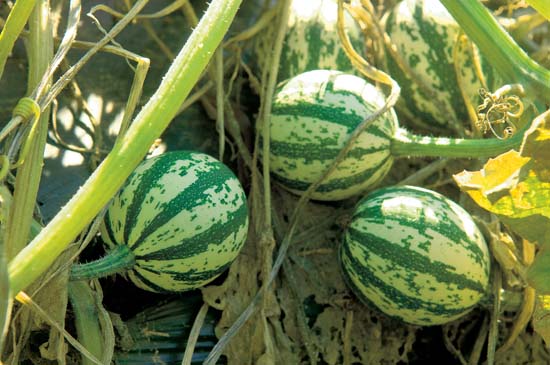 |
 |
| current issue |  |
past issues |  |
send a letter/news |  |
address update |  |
advertise |  |
about us |  |
alumni home |
Features
The MatchmakerPage 4 of 4
"That's just the way it goes sometimes, but it's frustrating to think about," he says. "Japan requires its growers to grow this one particular variety that was developed by a Japanese seed company in the late 1970s. When you think about all the improvements we've made to these kabochas in the last 30-plus years, that's just nuts."
Loy cares that Japanese growers are denied access to a better product, and he cares that growers in New Hampshire and California and Canada are successful in their efforts to grow beautiful, healthy fruit and vegetable crops. To that end, he has become a singular resource for industry organizations. He advises the Canadian Department of Agriculture and Agri-Food on planting tips, lectures abroad on intellectual property agreements for sharing germplasm (seed bank), and gives The New York Times his expert opinion on what to do about winter squashes that have a "squunky" taste. (Throw them out, he says.) He collaborates with breeders at seed companies—including Johnny's Selected, High Mowing Organic Seeds and Rupp Seeds—to create new, joint hybrids bred from one of his parent lines and one of theirs, often to great effect. His award-winning Honey Bear squash, for example, was a joint hybrid created with Rob Johnston at Johnny's Selected Seeds.
 Lisa Nugent/UNH Photographic Services
Lisa Nugent/UNH Photographic Services
|
One area where Loy tends not to get involved is in the naming of his cultivars, a task he typically leaves to the seed companies (although he did name the Snackjack). The trade-off is simple: he grows hybrids that taste delicious; the companies give them "delicious" names.
Having recently logged both his 70th birthday and a knee replacement, Loy flirts with the idea of retiring, but there are always new hybrids to tackle, like a moschata-maxima cucurbit cross he and Uretsky are working on. There are recent successes to nurture, like his 2008 Slick Pik yellow squash that has smooth, not prickly, stems, meaning less fruit damage at harvest time. And though he is best known for his research, Loy feels an obligation to provide practical, hands-on learning to students.
"When I started here back in the 1960s, it wasn't unusual for students to come from farming families, and to get their degree with the intent of going back to the farm," he says. "Now, though, students tend to come with somewhat romanticized ideas about agriculture. That's not to say I want to discourage them from being farmers. It's just important that they have a realistic picture of what they're signing themselves up for."
Loy sees a lot to be optimistic about in new programs such as UNH's sustainable agriculture and food systems major and in individuals like Uretsky and Cui, who represent the next generation of his work. "The project Jake is working on right now is cross-species" involving a pumpkin and a squash, he explains. "Like when you breed a horse and donkey and get a mule. If it works, it will be something that's never been done before."
These days, Loy is "half retired"—he no longer teaches, and he holds a part-time appointment, supported by the N.H. Agricultural Experiment Station, to continue his breeding work through 2013. (NHAES also has supported Loy's research, and provides funding for Kingman and Woodman farms and the UNH greenhouses.) Eventually, he sees himself shifting the balance of his time from the university's 360 acres to the 5 he maintains at home in Epping with his wife, Sarah, where they grow much of their own produce. But as he moves among his Kingman cantaloupes—picking up a heavily netted tan fruit, opening up his pocket knife to carve out a wedge-shaped plug of the flesh, orange and fragrant in the summer heat—it's not hard to imagine him here for many years to come. Indeed, after tasting the cantaloupe, he tosses it to the side and upends the stake that marks this particular cross. It's ripened just a bit too soon, and while it's good—delicious, even—it isn't perfect. Not yet, that is. ~
Page: 1 2 3 4
Easy to print version
blog comments powered by Disqus

